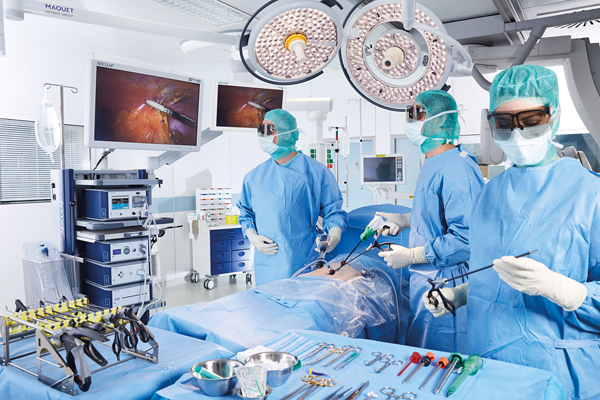Laparoscopy in Cyprus
Search and Compare the Best Clinics and Doctors at the Lowest Prices for Laparoscopy in Cyprus

Find the best clinics for Laparoscopy in Cyprus
No clinics available
Germany offers the best prices Worldwide
Price: $ 586

- Home
- Cyprus
WHY US?
At Medijump, we're making medical easy. You can search, compare, discuss, and book your medical all in one place. We open the door to the best medical providers worldwide, saving you time and energy along the way, and it's all for FREE, no hidden fees, and no price markups guaranteed. So what are you waiting for?

Free

Best Price

Widest Selection

Risk-Free
What you need to know about Laparoscopy in Cyprus

Laparoscopy is a type of surgery that allows surgeons to access the inside of the abdomen and pelvis with only small incisions. Also known as minimally invasive or keyhole surgery, laparoscopy is less painful than traditional open surgery. Other benefits of this type of surgery include less bleeding, reduced scarring, and a faster recovery period.
What does a Laparoscopy Procedure Involve?
Laparoscopy is performed under general anesthetic. During the surgery, your surgeon makes small incisions in your abdomen to insert an instrument called a laparoscope, small surgical tools, as well as a tube to pump gas into the abdomen. A laparoscope is a small tube with a camera and a light attached to its end and the camera sends images of the inside of the abdomen to a monitor.
How Long Should I Stay in Cyprus for a Laparoscopy Procedure?
You may be able to go back to your hotel immediately after a laparoscopy, but in some cases, you may need to stay for at least 1 to 2 days. You may be able to fly back home within 3 to 7 days after the surgery. During your stay, you will have to attend hospital check-ups and to rest.
What's the Recovery Time for Laparoscopy Procedures in Cyprus?
The recovery period for laparoscopic surgery depends on the type of treatment. However, the overall recovery period is shorter than the traditional surgery. For example, the total recovery period for intestinal surgery with traditional methods may take 4 to 8 weeks, but with laparoscopic surgery, you only need 2 to 3 weeks to recover and return to work.
What sort of Aftercare is Required for Laparoscopy Procedures in Cyprus?
The aftercare will be different from one person to another, depending on what type of condition the surgery is used for. Your surgeon will tell you how to keep your wounds clean, the diet you will need to follow, and the type of exercise you can do. You will likely have a follow-up check-up with your local doctor to monitor your condition.
What's the Success Rate of Laparoscopy Procedures in Cyprus?
Laparoscopy is known to have a high success rate. Serious side effects, risks, and complications are rare. Minor complications occur in 1 out of every 100 cases, while serious complications occur in 1 out of every 1,000 cases. The side effects and risks include infection, minor bleeding, damage to an organ, or damage to a major artery.
Are there Alternatives to Laparoscopy Procedures in Cyprus?
Laparoscopic surgery is an alternative to traditional open surgery. You can always undergo open surgery if you prefer to do so. There are also some treatment alternatives to laparoscopic surgery, but this depends on the condition you want to treat.
What Should You Expect Before and After the Procedure
Before a laparoscopy, you may have problems in your appendix, kidney, or other parts of your abdomen. After the surgery, these issues are treated and possibly resolved.
Whilst the information presented here has been accurately sourced and verified by a medical professional for its accuracy, it is still advised to consult with your doctor before pursuing a medical treatment at one of the listed medical providers
No Time?
Tell us what you're looking for and we'll reachout to the top clinics all at once
Enquire Now

Popular Procedures in Cyprus
Prices Start From $520

Recommended Medical Centers in Cyprus for procedures similar to Laparoscopy

- Interpreter services
- Translation service
- Religious facilities
- Medical records transfer
- Medical travel insurance
- Health insurance coordination
- TV in the room
- Safe in the room
- Phone in the room
- Private rooms for patients available

- Interpreter services
- Translation service
- Religious facilities
- Medical records transfer
- Medical travel insurance
- Health insurance coordination
- TV in the room
- Safe in the room
- Phone in the room
- Private rooms for patients available

- Interpreter services
- Translation service
- Religious facilities
- Medical records transfer
- Medical travel insurance
- Health insurance coordination
- TV in the room
- Safe in the room
- Phone in the room
- Private rooms for patients available

- Interpreter services
- Translation service
- Religious facilities
- Medical records transfer
- Medical travel insurance
- Health insurance coordination
- TV in the room
- Safe in the room
- Phone in the room
- Private rooms for patients available

- Interpreter services
- Translation service
- Religious facilities
- Medical records transfer
- Medical travel insurance
- Health insurance coordination
- TV in the room
- Safe in the room
- Phone in the room
- Private rooms for patients available

- Interpreter services
- Translation service
- Religious facilities
- Medical records transfer
- Medical travel insurance
- Health insurance coordination
- TV in the room
- Safe in the room
- Phone in the room
- Private rooms for patients available

- Interpreter services
- Translation service
- Religious facilities
- Medical records transfer
- Medical travel insurance
- Health insurance coordination
- TV in the room
- Safe in the room
- Phone in the room
- Private rooms for patients available

- Interpreter services
- Translation service
- Religious facilities
- Medical records transfer
- Medical travel insurance
- Health insurance coordination
- TV in the room
- Safe in the room
- Phone in the room
- Private rooms for patients available

- Interpreter services
- Translation service
- Religious facilities
- Medical records transfer
- Medical travel insurance
- Health insurance coordination
- TV in the room
- Safe in the room
- Phone in the room
- Private rooms for patients available

- Interpreter services
- Translation service
- Religious facilities
- Medical records transfer
- Medical travel insurance
- Health insurance coordination
- TV in the room
- Safe in the room
- Phone in the room
- Private rooms for patients available
Laparoscopy in and around Cyprus
Cyprus is an island country in the Mediterranean Sea. The country is famous for its mineral wealth, splendid wines, dazzling beaches, and compelling culture. In addition, Cyprus is filled with classical ruins and century-old monasteries, and as the legendary birthplace of Aphrodite, it is also steeped in mythology. Due to its huge array of modern private medical centers equipped with excellent service, cutting-edge technology, and skilled doctors, Cyprus is also a thriving medical tourism destination. Foreign patients from all around the globe come to this country for a vast range of medical treatments, particularly bariatric surgery, cardiology, cosmetic and plastic surgery, and fertility treatments. Its spa and well-being resorts are also welcoming an increasing number of international medical tourists.
Popular Parts of Cyprus
The majority of tourists start their trip to Cyprus in Larnaca, it is the oldest city in Cyprus. It has a vast array of historical monuments, including Ayios Lazaros (the Church of Saint Lazarus), Stavrovouni Monastery, and Larnaca Medieval Castle. Besides its ancient buildings, Mackenzie Beach and Larnaca Marina are also popular among tourists. Not too far from Larnaca is Paphos, a charming city with exquisite natural beauty and all sorts of ancient ruins. The most popular attractions in this city include the Tombs of the Kings, the Old Town, Early Christian Basilica-St Paul’s Pillar, and Paphos UNESCO Archaeological Park. Nicosia, Cyprus’ capital, is also a popular destination.
Weather and Climate in Cyprus
Cyprus experiences a Mediterranean climate with four seasons and over 300 days of sunshine a year. The summer is long, warm, and dry, lasting from mid-May to mid-October. The winter starts in December and ends in February, bringing mild temperatures and more rain showers. Autumn and spring are short, but there is good weather.
Getting around in Cyprus
The main international gateway to Cyprus is Larnaca International airport. It serves international flights to many cities around Europe and the Middle East, including Kyiv, Abu Dhabi, London, and Moscow. In the south, the intercity bus system is reliable and great, but in the north, the bus services are often unreliable and do not seem to follow a timetable. Taxis are a safe and relatively inexpensive option. In the south, there are three types of taxi services: urban, trans-urban or interurban (shared and can be booked), and rural. In the north, taxis are only available in the main towns. Inside towns, buses are the best way to get around for those looking for a more affordable option. Taxis are more expensive, but they do offer more flexibility.
Tourist Visas in Cyprus
Nationals of EU countries, the United States, Australia, Canada, Britain, Iceland, Japan, and several other countries do not need a visa to visit and stay in Cyprus for up to 90 days. Other countries not listed in the visa-free agreement need to apply for a visa before entering Cyprus. It is best to consult the Cypriot Ministry of Foreign Affairs or contact the embassy to learn more about visa requirements.
Additional Information
- Local Currency: The euro (€) has been the official currency of Cyprus since 1 January 2008. The exchange rate from €1 is approximately US$1.17.
- Money & Payments: It is easy to find reliable ATMs in large towns and tourist areas. Major credit cards, such as Visa and MasterCard, are widely accepted in larger restaurants, shops, and hotels. However, if you plan to go to smaller towns or villages, it is best to ensure you have cash. Tipping is expected most of the time. Tip at least 10% of the bill, and at least 5% or round up to the nearest euro for taxi drivers.
- Local Language: Around 80% of Cypriots speak Greek as their first language, while Turkish is spoken by 10% of the population. English is widely spoken, especially in tourist areas.
- Local Culture and Religion: The main religion of Cyprus is Greek Orthodox, but Islam is the most prominent religion in the north.
- Public holidays: Some of the most celebrated holidays in Cyprus include Ohi Day, Christmas Day, Boxing Day, New Year’s Day, Epiphany, Clean Monday, Cyprus National Day, and Independence Day.
Popular Searches
- Plastic Surgery in Thailand
- Dental Implants in Thailand
- Hair Transplant in Thailand
- Breast Augmentation Thailand
- Gastric Sleeve in Thailand
- Gender Reassignment Surgery in Thailand
- Laser Hair Removal in Bangkok
- Botox in Bangkok
- Dermatology in Bangkok
- Breast Augmentation in Bangkok
- Coolsculpting in Bangkok
- Veneers in Turkey
- Hair Transplant in Turkey
- Rhinoplasty in Turkey
- Stem Cell Therapy in Mexico
- Rhinoplasty in Mexico
- Liposuction in Mexico
- Coolsculpting in Tijuana
- Rhinoplasty in Korea
- Scar Removal in Korea
- Gastric Sleeve in Turkey
- Bone Marrow Transplant in India
- Invisalign in Malaysia
- Plastic Surgery in the Dominican Republic
- Tummy Tuck in the Dominican Republic
- Plastic and Cosmetic Surgery in Poland
- Rhinoplasty in Poland
- Hair Implant in Poland
- Dental Implants in Poland
- IVF in Turkey